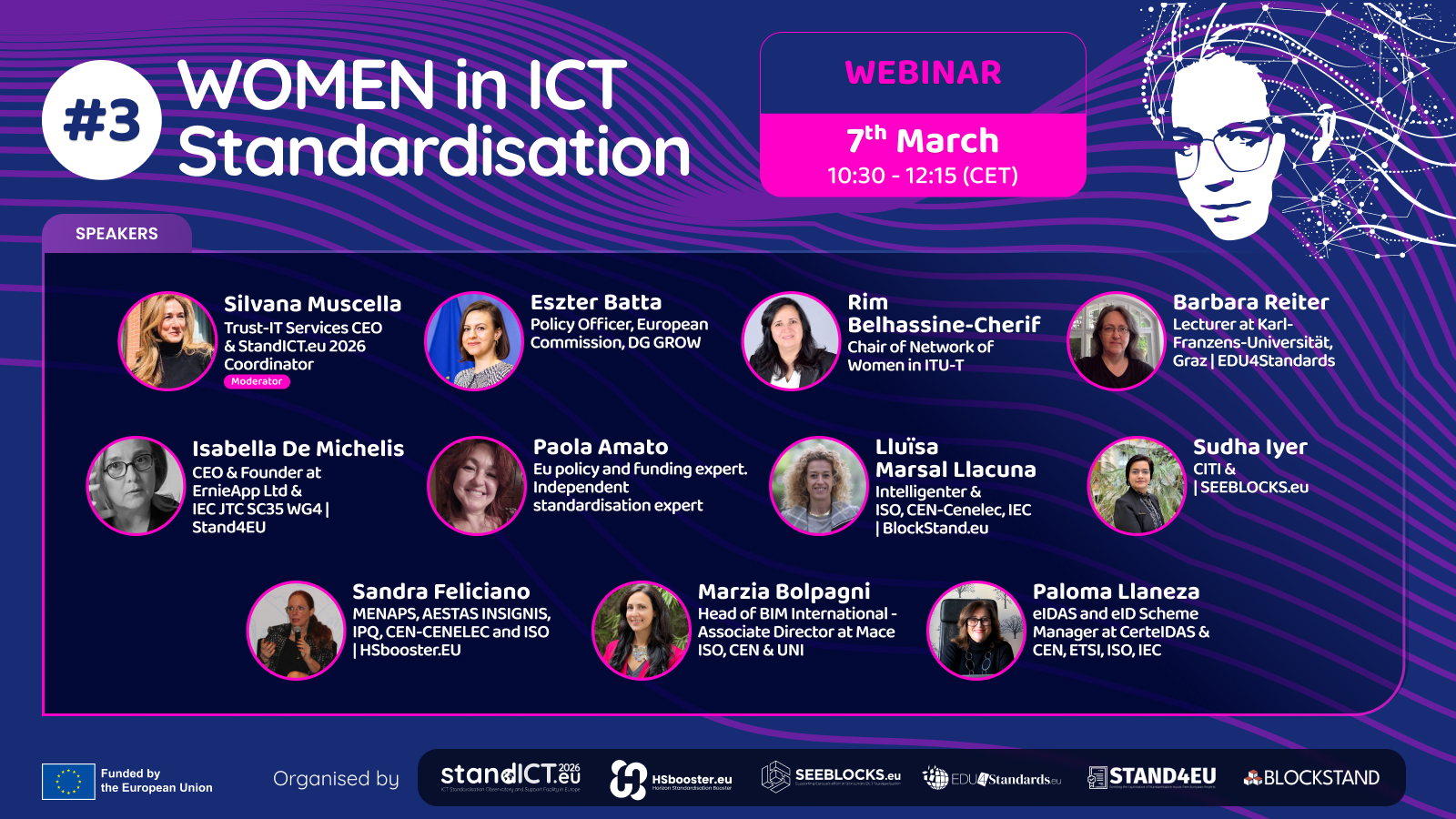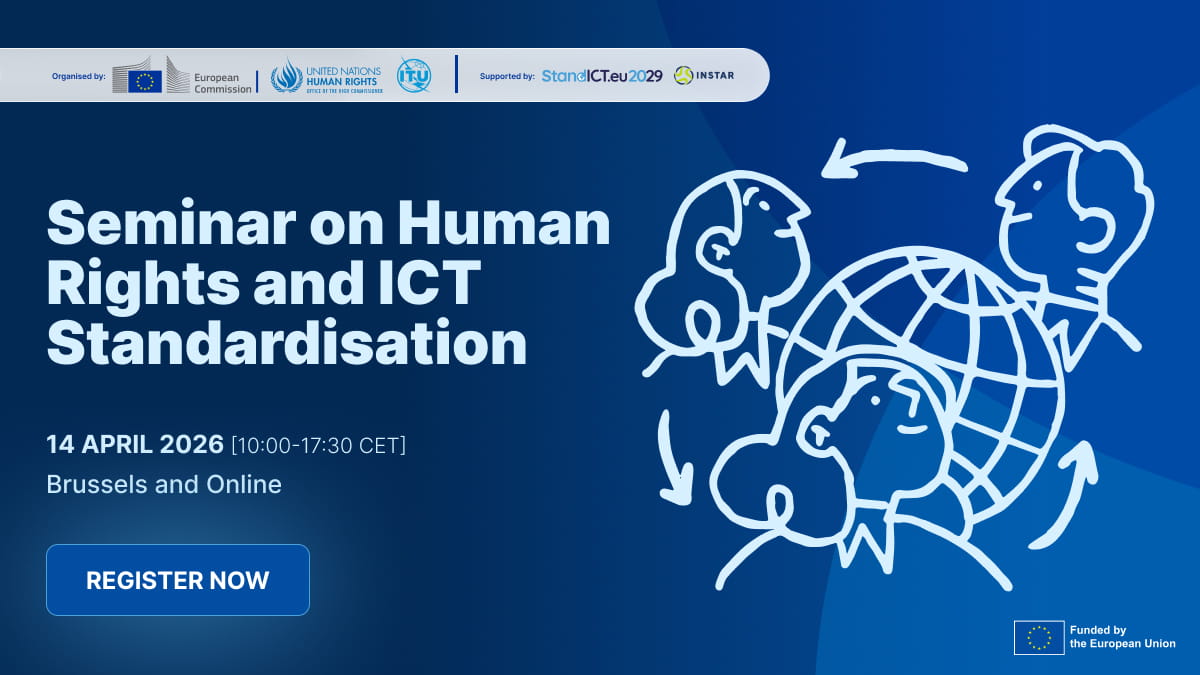Read time: 7 mins

The Women in ICT Standardisation webinar is back for its third edition, bringing together leading voices in the field of European standardisation. This year, StandICT.eu is proud to join forces with five other EU-funded projects dedicated to advancing European standardisation activities. Together, we aim to deliver comprehensive and content-rich messages that address key priorities outlined in the Annual Union Work Programme for European Standardisation for 2024. Join us for an insightful discussion on the importance of gender diversity in ICT standardisation and its impact on European policy priorities. We're currently finalising the agenda but we can already tell you that the event will host an outstanding panel of Standardisation Experts!
The main objective of this webinar is to discuss and highlight the key gender gaps in ICT standardisation, with a particular focus on the 8 policy priorities identified by the European Commission (EC) in the Annual Union work programme (AUWP) for European standardisation. The webinar aims to:
- Analyse the main obstacles and problems that persist in ICT standardisation;
- Discuss and analyse the main results and achievements obtained at the European and International level in promoting equity and inclusion in this field;
- Provide examples of practices and experiences empowering the role of women in standards development organisations and technical committees in the ICT domains;
- Give a general overview of the main gender gaps in the 8 policy priorities identified under the AUWP.
Speakers
Esteemed representatives from various European and International Standards Developing Organisations will animate the debate over the webinar. The speakers have been selected based on their expertise and experience in promoting diversity, equity and inclusion in the field of ICT Standardisation, as well as their contributions to the development of standards in the respective ICT technological domains.
- Eszter Batta - Policy Officer, European Commission, DG GROW
Annual Union Work Programme on Standardisation 2024 - Silvana Muscella - Trust-IT Services CEO & StandICT.eu 2026 Coordinator - Event Moderator
Women in ICT Standards, a focus on Gender Gap in ICT Standardisation in connection with European Commission Annual Union work programme - Rim Belhassine-Cherif, PhD - Chair of Network of Women in ITU-T
ITU-T activities on promoting gender equality in standardisation - Barbara Reiter (University of Graz, EDU4Standards)
Education for Standardisation in the EU - Isabella De Michelis CEO & Founder at ErnieApp Ltd &
IEC JTC SC35 WG4 (ISO, Stand4EU)
EU Trusted Data Framework - Paola Sabatelli Amato - (HSbooster.eu & StandICT.eu)
Hydrogen: understanding the EU policy context - Lluïsa Marsal Llacuna - Intelligenter, (ISO CEN-Cenelec, IEC, ITU-T, BlockStand.eu)
The Challenge of Standardising Standards: Blockchain Standardisation as an Example - Sudha Iyer - CITI & SEEBLOCKS.eu
Turning the Tide: CyberSecurity Standards - Sandra Feliciano - Head of Research Engagement - AI & Cybersecurity at MENAPS, (ISO, IPQ, CEN-CENELEC, HSbooster.eu)
From ICT Quality to Cybersecurity: The return of the prodigalsondaughter - Marzia Bolpagni - Associate Director at Mace (ISO, CEN-CENELEC, UNI)
Improve the greening and climate resilience of buildings and construction materials - Paloma Llaneza - eIDAS and eID Scheme Manager, CerteIDAS (CEN, ETSI, ISO, IEC)
EU digital Identity Framework
Bios
Eszter Batta
Eszter Batta is a Policy Officer at the European Commission's DG GROW, focusing on clean tech standards and international standard-setting within the Standardisation Unit. Her experience spans industry policy, single market, and R&I policy development since 2008. Before this, she contributed to several topics in Commissioner Breton's Cabinet. Eszter is an alumnus of Corvinus University of Budapest and the University of Cologne, with fluency in Hungarian, English, German, French, and Spanish.
Rim Belhassine-Cherif
Rim Belhassine-Cherif, PhD, is the Chair of the Network of Women in ITU-T and serves as the Chief Innovation and Strategy Officer at Tunisie Télécom. As a general engineer, she oversees the digital transformation at Tunisia's primary telecom operator. Her role emphasizes innovation within the telecom industry, supporting advancements in ITU-T's work and promoting women's involvement in technology.
Barbara Reiter
Dr. Barbara Reiter is a philosopher and lecturer specializing in the didactics of philosophy and ethics at the University of Graz. Born in Coburg, Upper Franconia, she pursued her studies in philosophy in Würzburg, Berlin, and Bremen. Following experiences in the United States and Switzerland, she has resided with her family in Graz for the past decade. Dr. Reiter's academic interests span various topics including the pursuit of the good life, Aristotelian philosophy, value transmission, feminism, humanization, media philosophy, theories of chance, contingency, fragility, computer ethics, and serendipity.
Isabella De Michelis
Isabella De Michelis is the founder and CEO of ErnieApp. The company's flagship, the Privacy Knowledge Manager app, offers a unique privacy service based on GDPR articles. Launched in 2020, the app has gained traction for its user-centric privacy management. De Michelis also heads High Pulse, consulting on digital transformation across Europe. Her expertise spans digital policy, data governance, and strategic innovation.
Paola Amato
Paola Amato combines expertise in architecture, EU legislation, and climate adaptation. She has served in diverse roles, including auditor, researcher, and EUAA Operation funding expert. Currently, she advises H2020 and Horizon Europe projects as an HSBooster expert. Her work spans standardization, energy solutions, and SME innovation, contributing to urban and environmental sustainability.
Maria-Luisa Marsal Llacuna
Maria-Luisa Marsal Llacuna is an architect with extensive expertise in urban planning and ICT. As founder of Intelligenter.org, she consults on smart cities and technology. Her background includes leadership in academia and roles in public and private sectors focusing on urban innovation. Maria-Luisa has contributed to standardisation and served as a UN Habitat III expert, holding significant positions in standardization committees and European research programmes.
Sudha E. Iyer
Sudha E. Iyer leads Cybersecurity Architecture for Data at Citi, shaping strategies for digital asset security and Web 3.0. With two decades in the financial sector, she has influenced cybersecurity practices and contributed to the ISO Technical Committee on Smart Contracts. Her efforts at Citi underscore the importance of secure, resilient cybersecurity frameworks in supporting business operations.
Sandra Feliciano
Sandra Feliciano (Head of Research Engagement - AI & Cybersecurity at MENAPS) is a standardisation and conformity assessment expert, winner of the CEN-CENELEC Standards+Innovation 2021 TBO Award. She has a holistic experience with standards, researching and leading its development, as well as teaching, implementing and auditing their compliance in diverse industry sectors (ICT, Aerospace, Education, Health and Social Care Services)
Marzia Bolpagni
Marzia Bolpagni is Mace's Head of BIM International, focusing on digital construction solutions worldwide. An active member in standardisation bodies like UNI, CEN, and ISO, she contributes to developing industry-academia links and digital transformation. Marzia's leadership in BIM and information standardization has earned her international recognition and awards, highlighting her contributions to construction innovation.
Paloma LLaneza
Paloma LLaneza is CEO & Head of Technology at Razona, offering expertise in technology consulting, and serves as eIDAS & eID Scheme Manager at CerteIDAS. A lawyer and CISA-certified auditor, her work spans ISMS standards, trust service certifications, and data protection. She has significantly contributed to international standardization, including efforts in blockchain-based sovereign identity through Alastria ID.
Background
ICT standards hold immense importance at the EU level, representing one of the most relevant subjects on the EU political agenda to uphold the competitiveness of the European Union in critical industries. Consequently, there is an urgent need for regulation and identification of the sectors in which ICT standards are mostly required. The European Commission has recently published the 2024 Annual Union work programme for European standardisation in which it has identified 8 main policy priorities that needs to be addressed.
StandICT.eu aims to address these topics from a gender perspective. Gender equality in science, technology, engineering, and mathematics (STEM) is one of the core issues both at the international and European levels. This webinar emphasises the voices of women expert in ICT standards, particularly focusing on the 8 policy priorities identified in the 2024 Annual Union work programme for European standardisation:
- Technologies for European high performance computing and European quantum communication infrastructure;
- Critical Raw Materials (CRM) - Recycling of permanent magnets and exploration, extraction, refining and recycling of CRM;
- EU Trusted Data Framework;
- European digital identity framework;
- Eco-design of air-to-air conditioning and heat pumps;
- Cybersecurity requirements;
- Hydrogen technologies and components;
- Electric vehicles charging infrastructure.
The webinar has been organised in a joint effort by StandICT.eu in collaboration with other EU-funded projects, namely HSBooster.eu, SEEBLOCKS, Edu4Standards, Stand4EU and Blockstand.
Target audience
The target audience for this webinar includes ICT Specialists and Professionals under the main Digital Single Market & Digital Europe domains, Standard Developing Organisations' representatives, Members of Research Institutes working in ICT Standard Development, Representative of National Standards Associations, general audience and civil society organisations involved in the promotion of women in STEM disciplines and education.
Duration
The webinar will last approximately 90 minutes, including interactive Q&A sessions.
Stay tuned for updates on speakers and agenda details!
